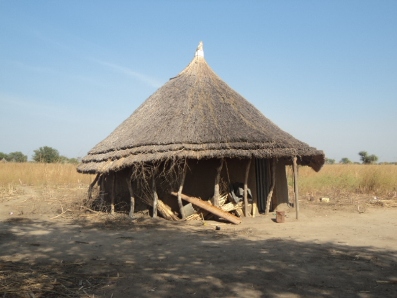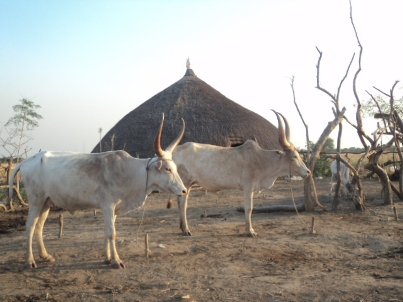Jonglei: Villagers asked to return home, start farming
April 6, 2012 (BOR) – The Makuach Payam (district) of Jonglei State is home to 29,000 people according to officials but only a small fraction now remains after many people deserted the villages and fled to Bor town seeking protection from a wave of violence between cattle herding groups in December and January.

“In the headquarters [of Makuach], there were 5,000 people before February but now there are only about fifty people who have remained,” Mabil Duot, the civil administrator for Makucah said, sitting on a large fence surrounding his house, which is also an office and clinic.
Health officials and primary school teachers are among those who left the district, 20 kilometres east of Bor, the capital of Jonglei State. The school, has not reopened this term, and is now used by soldiers as their headquarters while they carryout a disarmament campaign. As part of the process local chiefs in the area have collected guns from their young men and handed them over to the army.
The few people who remain in the village say there is no option but to remain here and take their chances after the army leaves.
Mary Adit told Sudan Tribune the army presence had forced away raiders from the neighbouring Murle tribe but added that the community is not sure if they will be safe when the army move on to another area.
Jonglei State is home to pastoralist communities that often engage in cattle rustling and child abduction. In recent years, the scale of attacks increased leaving over 1,000 dead in 2011 and thousands of others displaced.
Attacks over Christmas and New Year displaced over 100,000 people, many of whom are yet to return to their lands in remote areas.
In mid-March, South Sudan’s President Salva Kiir launched a state-wide disarmament process, which is being carried out by a 15,000 army and police force.
So far around 10,000 riffles have been collected from civilians who had held on to their guns to protect their animals and villages from rival communities. In Bor County, home to the Dinka Bor ethnic group, 4,000 riffles were collected on the first day of disarmament and displayed by government and army officials. Last week, the commander of Operation Restore Peace in Jonglei, Maj. Gen. Kuol Diem Kuol, displayed 645 guns collected from Pibor County, home to Murle tribe.
Thousands riffles are said to have been collected in Lou Nuer areas despite resistance from a local religious leader and self-proclaimed prophet, known as the “magician”, who the army says evaded the disarmament campaign and headed to towards the Ethiopian border.
In Makuach, local administrators hope that the disarmament process will restore peace and that villagers who ran away will be able return.
“People have to come back and farm. There is no way you stay in Bor [town] when you are not working since there is security now,” district administrator Mabil said.
The scale of attacks have reduced, but have not disappeared completely Mabil admitted but “it is better now,” he added.

In mid-March, a woman was hacked to death a few kilometres away from Makuach centre by alleged Murle raiders. She had come to Makuach from neighbouring Anyidi Payam but met her assailants while returning home. Mabil says this is a threat “but the government is promising and we cannot leave our villages. People should not give up.”
Jonglei State’s government has also urged villagers to return home and farm. In 2011, Jonglei State was rated among the most food insecure in South Sudan due to tribal conflicts and flooding. The rainy season is fast approaching but local farmers in Bor are not yet clearing their farms in preparation for planting crops raising fears of an even lower harvest this year.
Kuol Bol Ayom, a member of parliament in Jonglei State Assembly representing Athoc North of Bor County, says there is no need to stay in town.
“We are telling our people to return home and work on their farms and the government must take their security seriously because they completely disarmed,” Bol said.
Bol is not certain that the neighbouring Murle tribe have been properly disarmed alleging that “most of them are not in their (Pibor) county. They are here in our bushes dodging the army.”
(ST)
